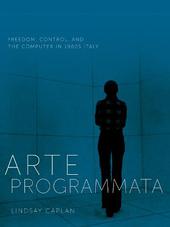
|
Arte Programmata: Freedom, Control, and the Computer in 1960s Italy
Paperback / softback
Main Details
| Title |
Arte Programmata: Freedom, Control, and the Computer in 1960s Italy
|
| Authors and Contributors |
By (author) Lindsay Caplan
|
| Physical Properties |
| Format:Paperback / softback | | Pages:312 | | Dimensions(mm): Height 203,Width 152 |
|
| Category/Genre | Art History
Electronic, holographic and video art
Ethical and social aspects of computing |
|---|
| ISBN/Barcode |
9781517909956
|
| Classifications | Dewey:702.81 |
|---|
| Audience | | General | | Professional & Vocational | |
|---|
| Illustrations |
47 black and white illustrations and 8 color plates
|
|
Publishing Details |
| Publisher |
University of Minnesota Press
|
| Imprint |
University of Minnesota Press
|
| Publication Date |
25 October 2022 |
| Publication Country |
United States
|
Description
Tracing the evolution of the Italian avant-garde's pioneering experiments with art and technology and their subversion of freedom and control In postwar Italy, a group of visionary artists used emergent computer technologies as both tools of artistic production and a means to reconceptualize the dynamic interrelation between individual freedom and collectivity. Working contrary to assumptions that the rigid, structural nature of programming limits subjectivity, this book traces the multifaceted practices of these groundbreaking artists and their conviction that technology could provide the conditions for a liberated social life. Situating their developments within the context of the Cold War and the ensuing crisis among the Italian left, Arte Programmata describes how Italy's distinctive political climate fueled the group's engagement with computers, cybernetics, and information theory. Creating a broad range of immersive environments, kinetic sculptures, domestic home goods, and other multimedia art and design works, artists such as Bruno Munari, Enzo Mari, and others looked to the conceptual frameworks provided by this new technology to envision a way out of the ideological impasses of the age. Showcasing the ingenuity of Italy's earliest computer-based art, this study highlights its distinguishing characteristics while also exploring concurrent developments across the globe. Centered on the relationships between art, technology, and politics, Arte Programmata considers an important antecedent to the digital age.
Author Biography
Lindsay Caplan is assistant professor in the History of Art and Architecture Department at Brown University.
Reviews"Lindsay Caplan's Arte Programmata offers a compelling account of a group of lesser-known artists affiliated with the Italian Arte Programmata movement, whose experimental art and design practices, emerging in the nascent years of computerization, pointedly (and presciently) engaged with political questions around freedom and control, individuality and collectivity. Beautifully written, sharply analytic, and free of jargon, Caplan's incisive study should find a place on the bookshelves of anyone interested in the roots and impacts of technological change."-Janet Kraynak, author of Contemporary Art and the Digitization of Everyday Life "Arte Programmata forces us to reconsider ossified ideas about the relationship between politics and aesthetics by asking us to think seriously about what we mean when we reflexively invoke concepts such as resistance, subversion, and negation to understand radical art and design practices. In doing so, Lindsay Caplan disrupts the categories and boundaries circumscribing art history's presumed objects and methods. Here, art, design, theory, and politics comingle in new ways that allow us to see the continuing relevance of a particular strand of Italian art and design while also inspiring readers to reconsider their own assumptions about the many forms freedom might take in both our intellectual work and our lives."-Larry D. Busbea, author of The Responsive Environment: Design, Aesthetics, and the Human in the 1970s "Arte Programmata is simultaneously revolutionary and pragmatic."-Leonardo Reviews
|